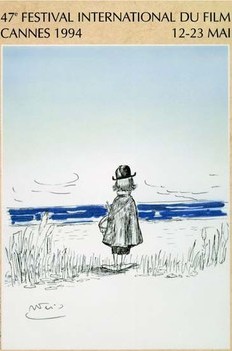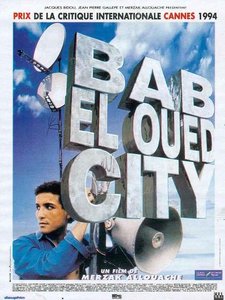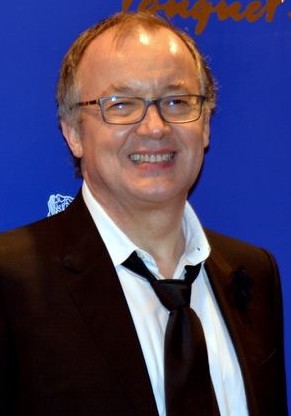Film career
Allouache returned to Algeria in 1973 and worked on organizing CinéBus campaigns in support of the agrarian revolution. He worked as an advisor for the Ministry of Culture. [5] He directed a documentary film about this work called Nous et la révolution agraire (Us and the Agrarian Revolution) in 1972. [7] In 1974, he co-directed for the Office National pour le Commerce et l'Industrie Cinématographique (ONCIC) Tipasa l'ancienne, a documentary on the site of Tipasa, in co-production with FR3 Marseille. Before joining ONCIC as a director in 1975, he was assistant director on Le Vent du Sud directed by Mohamed Slim Riad, also in 1974. [7]
He gained international fame in 1977 by directing his first feature film Omar Gatlato (1976), which takes a cynical but realistic look at the alienation of men in Algerian society, which was selected at the Semaine de la Critique in Cannes and won a Silver Medal at the Moscow Film Festival. [8] Then he directed Les Aventures d'un héros in 1978, a film about an Algerian father who falsely labels his infant son as the hero his tribe has been waiting for, which received the Thanit d'or at the Carthage Film Festival, and directed L'Homme qui regardait les fenêtres in 1982.
Allouache returned to France and wrote a screenplay for TF1, Parlez après le signal sonore, and, in 1987, directed a feature film Un amour à Paris, a love story about two Algerians: a model and an ex-con, screened in the Perspectives of French Cinema section at the Cannes Film Festival, winning the Perspectives of French Cinema Prize.
He returned to Algeria in 1988 in the aftermath of the October riots. [5] He filmed video documentaries on the political situation with many interviews that were gathered in three documentaries for ARTE: L'Après-Octobre, Femmes en mouvements, and Vie et mort des journalistes algériens. [5] In 1989, he directed a satirical program for Algerian television, La Boîte à chique, and then joined the National Audiovisual Council, a structure in charge of reforming cinematography when the Ministry of Culture was dissolved. In 1992, he directed a documentary for the BBC, Our War, Voice of Ramadan. In 1993, as Algeria sank into violence, he directed in extremis a feature film, Bab El-Oued City which follows the conflict between a young Algerian man and the local Islamic fundamentalists, screened in the Un Certain Regard section at the Cannes Film Festival.
He was forced to leave for France once again in the 1990s due to dangerous conditions for working artists [5] In 1996, he directed a film about two cousins navigating racism in Paris, Salut Cousin , which was screened in the Directors' Fortnight at the Cannes Film Festival, won a Thanit d'or at the Carthage Film Festival, and was submitted to the 69th Academy Awards. [9] After directing a series of films and TV movies, he returned to Algeria in 1999.
Since 2000, Allouache has alternated his productions or co-productions between Algeria and France, where he lives. In 2003, he directed Chouchou , starring Gad Elmaleh, about a Maghrebi transgender woman who settles in Paris to find her nephew. He directed Bab el-Web in 2004, a comedy about the effects of the internet on Algerian youth. This film was partially funded by French sources, with the stipulation that at least fifty-one percent of the dialogue be recorded in French, despite the fact that all of the characters were Algerian. [5]
In 2009, Allouache wrote and directed the film Harragas , the story of young Algerian refugees who fled their home country on small boats into the Mediterranean. The film was partly funded by the Algerian government. However, they did not like the end result and the Algerian government has subsequently boycotted Allouache’s films and refused further support. [5] His 2011 film, Normal! , about a filmmaker in the aftermath of the December riots, won the award for Best Film at the 2011 Doha Tribeca Film Festival. [10] This film was a commentary on the Algerian government’s amnesty policy for terrorists. [5] In 2012 he directed Le repenti ( The Repentant ), a film about an Islamist released from prison who struggles to understand forgiveness, which was screened at the Directors' Fortnight at the Cannes Film Festival. [11] [12] It won a FIPRESCI Award at the 17th International Film Festival of Kerala. [13] In 2013 Les terrasses ( The Rooftops ) about life in Bab el-Oued, was screened at the Venice Film Festival [14] and in 2015 Madame courage , about a drug-user who tries to kick his habit, was screened at the Venice Film Festival. In 2016 a documentary fiction Enquête au paradis, which combines in-person interviews with a dramatized road trip was screened at the FIPA in Biarritz (Fipa d'or) at the Berlin Film Festival, [15] and in 2017 Vent divin was screened at the Toronto Film Festival.
















